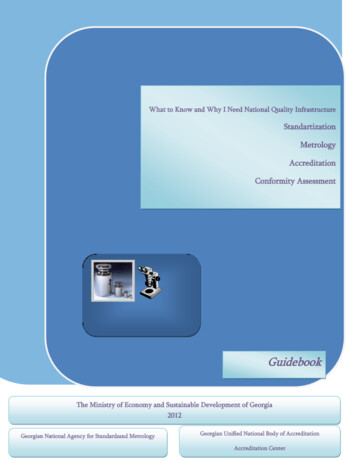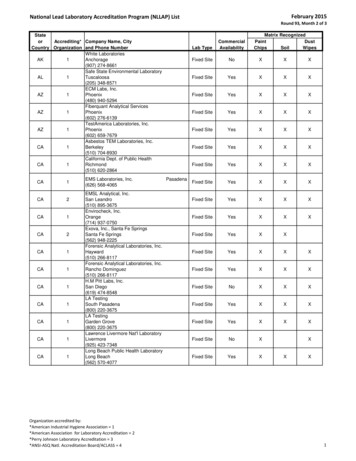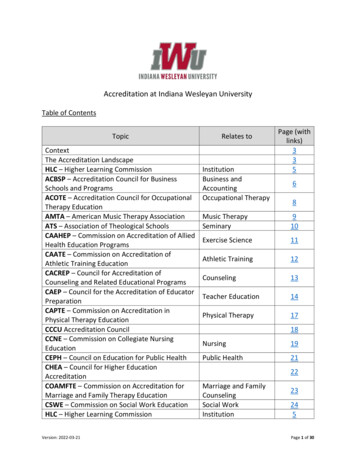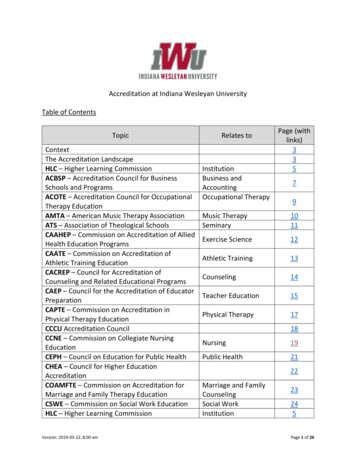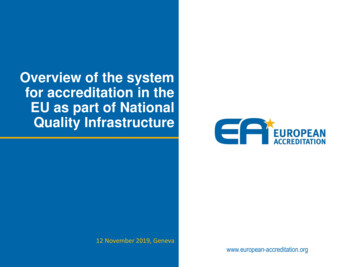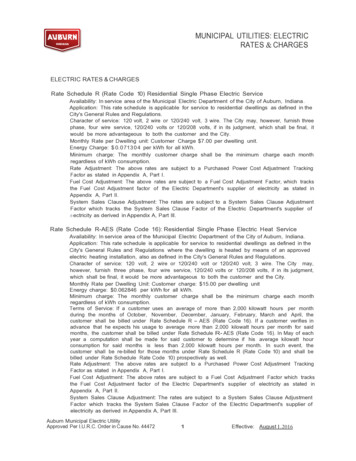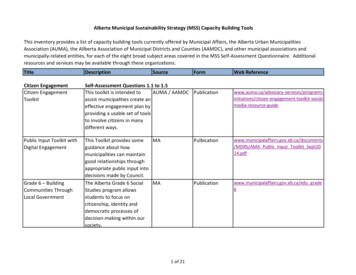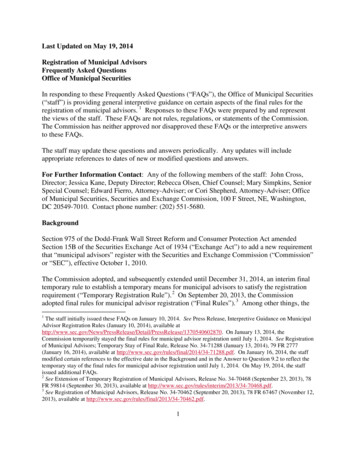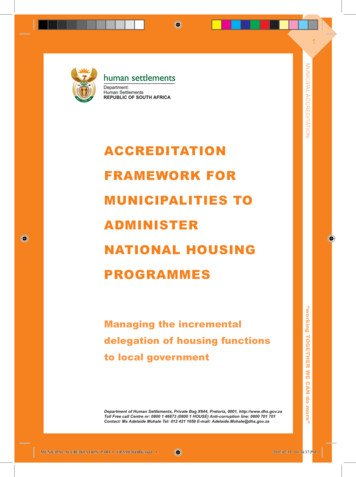
Transcription
1MUNICIPAL ACCREDITATIONACCREDITATIONFRAMEWORK FORMUNICIPALITIES TOADMINISTERNATIONAL HOUSINGPROGRAMMESdelegation of housing functionsto local governmentDepartment of Human Settlements, Private Bag X644, Pretoria, 0001, http://www.dhs.gov.zaToll Free call Centre nr: 0800 1 46873 (0800 1 HOUSE) Anti-corruption line: 0800 701 701Contact: Ms Adelaide Mohale Tel: 012 421 1659 E-mail: Adelaide.Mohale@dhs.gov.zaMUNICIPAL ACCREDITATION PART 1 FRAMEWORK.indd 1“working TOGETHER WE CAN do more”Managing the incremental2011/02/15 01:34:37 PM
MUNICIPAL ACCREDITATION2CONTENTSRationale for Accreditation5Conceptual Framework6Legislative Framework7Principles of Accreditation8Overall Approach10Three Levels of Accreditation10Obtaining Accreditation15Criteria16Capacity Support towards Accreditation18Institutional Arrangements19Changes to Housing Roles19Institutional Arrangements22Summary of Key Accreditation Functions24Funding arrangements26“working TOGETHER WE CAN do more”Allocation of Housing Subsidy Funds26Claw Back26Funding for Individual and Relocation Subsidy Mechanisms27Operational FundingFunding Flows2727Equitable Subsidy Allocation27Operational Funding: Accreditation Fee27Capacitation Funding28Summary28MUNICIPAL ACCREDITATION PART 1 FRAMEWORK.indd 22011/02/15 01:34:37 PM
3Capacity Support3030Accreditation Units at PHD Level30Accreditation Unit at NDoH Level31Governance, Reporting and Oversight Arrangements31Conflict Resolution, Mediation and Arbitration32Systems and Procedures33Subsidy Registration35Financial Administration36Ongoing reporting and monitoring requirementsMUNICIPAL ACCREDITATIONHuman Resources Implications at PHD Level37Implementation Arrangements37Identification of Municipalities for Accreditation.38List of FiguresAccreditation Institutional Arrangements23Figure 2:Governance, Reporting and Oversight Arrangements31Figure 3:Subsidy Registration35Table 1:Levels of Housing Accreditation14Table 2:Accreditation criteria by level16Table 3:Revised Housing Roles withList of TablesRespect to Municipal Accreditation19Table 4:Summary of housing functions25Table 5:Accreditation Functions and HR capacity implications29Table 6:Systems & Procedures33MUNICIPAL ACCREDITATION PART 1 FRAMEWORK.indd 3“working TOGETHER WE CAN do more”Figure 1:2011/02/15 01:34:37 PM
MUNICIPAL ACCREDITATION4Abbreviations and DefinitionsThe following abbreviations and definitions are used within these DORAHSSIDPITIYM“working TOGETHER WE CAN do SPFMASCMSCMAccreditation Business PlanAccreditation is a concept within the Housing Act, 1997;Housing Code, 2000; and DORA, 2005.Accreditation as a concept relates to entities and their approvalfor a particular purpose in accordance with certain criteria.Assignment is a concept in the Constitution, and relates to thetransfer of functions (including the authority in respect thereof) toanother sphere of governmentBreaking New Ground: The New Housing Strategy forSustainable Human Settlements, approved by Cabinet inSeptember 2004Delegation is the authority to exercise powers of anothersphere of government.Division of Revenue Act (Annual)Housing Subsidy SystemIntegrated Development Plan,incorporating the municipality’s housing planInformation TechnologyIn-Year Monitoring report of expenditure against budget and fundstransferred required to be submitted before the 20th of everymonth in terms of DORA and Treasury requirementsKey Performance IndicatorLevel of accreditation applied for.There are three levels of accreditation.Provincial Member: Executive Council responsible for housingCommittee of the Housing Minister, the nine housing MECsand a Councillor representing organised local governmentMunicipal Finance Management ActMunicipal Housing Committee delegated responsibility forhousing affairs by the municipal councilMunicipal Infrastructure GrantMedium Term Expenditure FrameworkNational Department of HumanSettlementsNational Housing Subsidy Data BaseProvincial Department of Human SettlementsPublic Finance Management ActSupply Chain ManagementSupply Chain ManagementMUNICIPAL ACCREDITATION PART 1 FRAMEWORK.indd 42011/02/15 01:34:37 PM
5The new human settlements plan envisages the accreditation of municipalities particularly the metropolitan areas. The framework willaddress various policy, constitutional and legislative aspects in order to enable municipalities to manage the full range of housing instruments within their areas of jurisdiction. In order to be accredited,municipalities will have to demonstrate their capacity to plan, implement, and maintain both projects and programs that are well integrated within IDPs and within the 3 year rolling capital investment programs mandated by the Municipal Finance Management Act (MFMA).MUNICIPAL ACCREDITATIONA C C R E D I TAT I O N F R A M E W O R K(Breaking New Ground, Part B, Section 5.2 “Expanding the role of local government”)Rationale for AccreditationThe national government and provincial governments must assign to a municipality,by agreement and subject to any conditions, the administration of a matter listed inPart A of Schedule 4 or Part A of Schedule 5 which necessarily relates to local government, if (a) that matter would most effectively be administered locally; and (b) themunicipality has the capacity to administer it. (The Constitution of the Republic of SouthAfrica, 1996; Section 156(4) [the Constitution]The rationale behind this move towards accreditation is rooted in the Constitution,and can be found further within the logic of good and cooperative governance, andcurrent constraints in the housing delivery process that are leading to decelerateddelivery and persistent provincial budgetary roll-overs.Accreditation seeks to achieve two inter-linked objectives: Coordinated development (horizontal integration): First, by locating thedecision making authority around the implementation of national housing programmes at the local sphere, municipalities can coordinate these decisions withother decisions that relate to the broader sustainability of human settlements.Municipalities are a logical site for the effective alignment of inter-departmentaland inter-governmental funding streams. With the authority to take such deci-MUNICIPAL ACCREDITATION PART 1 FRAMEWORK.indd 5“working TOGETHER WE CAN do more”Consistent with the Constitution, the accreditation of municipalities to administer national housing programmes has been emphasised as a key government priority insupport of an overall principle for cooperative government. Reference to the criticalneed for accreditation has been made by the President, in his State of the NationAddress in 2004, by the Minister of Housing when she delivered her Budget Speechto Parliament in both 2004 and 2005, by the National Department of Human settlements in its new housing strategy “Breaking New Ground” and by National Treasury,in the Division of Revenue Act, 2005. All of these references clearly indicate that itis government’s policy intention to locate the decision-making authority and fundingcapacity for local development at the most local sphere of government.2011/02/15 01:34:37 PM
MUNICIPAL ACCREDITATION6sions, opportunities for the application of innovative planning principles arise andthis contributes to the potential for the development of integrated and sustainablehuman settlements within municipal jurisdictions. This is a key emphasis of theComprehensive Plan for the Development of Sustainable Human Settlements,“Breaking New Ground”, as well as the Intergovernmental Relations FrameworkAct, 2005. Accelerated delivery (vertical integration): Second, the efficiencies associated with creating certainty in respect of funding allocations and devolving deliveryauthority to the local sphere should lead to accelerated delivery and improvedexpenditure patterns. This should result in a reduced requirement to roll overunspent funds as well as a more coordinated approach to planning approval andimplementation.Critically, the rationale and usefulness of any specific approach to accreditation (anddelegation) must be interrogated against these two objectives.It must also be noted that the accreditation of a municipality involves the delegationand, subsequently, assignment of certain clearly defined functions in respect of theadministration of national housing programmes. This does not detract from anyhousing functions or powers a municipality may already have, as set out in Part 4,Section 9 of the Housing Act; and, also does not include the power to design housingprogrammes to be funded from national housing subsidy funds.Conceptual Framework“working TOGETHER WE CAN do more”Before detailing the provisions of various laws impacting on accreditation it is necessary to explain certain legal concepts.Accreditation, technically, is the recognition by an authority of the fact that an entityhas met certain criteria and standards for purposes of fulfilling a particular function.Accreditation, in itself therefore does not transfer functions from one sphere of government to another. Legally, functions can only be transferred from one sphere ofgovernment to another through assignment or delegation.Assignment involves a permanent transfer of the function, which includes the transfer of the authority role – and this includes the right to receive directly the funds andthe assets necessary to perform the function.Delegation, on the other hand, is not a permanent transfer of functions. It doesnot include the transfer of the authority role, nor does it entitle the entity to which afunction has been delegated to legislate on the matter or to direct funding from thefiscus. Delegation merely entails the exercise of a function on behalf of the delegating authority. The ultimate authority still vest in the authority that delegates (who canrevoke the delegation or exercise the function him or herself).In this framework, the accreditation process is defined as a progressive process ofdelegation, evaluated against pre-agreed criteria, leading to eventual assignment ofall the functions by formal proclamation of assignment by the Premier in the Gazette.Because the Constitution requires assignment of housing functions, and because apermanent transfer of functions and authority is envisaged as the ultimate objective/MUNICIPAL ACCREDITATION PART 1 FRAMEWORK.indd 62011/02/15 01:34:37 PM
7Legislative FrameworkThe legislative framework for the accreditation of municipalities to be delegated responsibility to administer national housing programmes is rooted in the Constitutionand detailed in the Housing Act, 1997. Further to this, the annual Division of Revenue Act, 2005, and the draft guidelines to the Municipal Systems Act are also ofrelevance. MUNICIPAL ACCREDITATIONend goal, this framework provides for assignment as the ultimate outcome. However,in order to ensure that municipalities achieve the capacity necessary for assignmentin the long term without compromising their delivery capacity in the short term, a process of progressive delegation towards ultimate assignment is adopted.The Constitution of the Republic of South Africa, 1996: The overall provisionfor the assignment of functions to municipalities is set out clearly in the Constitution. Section 156(4) of the Constitution provides that the National governmentmust assign to a municipality, by agreement, and subject to any conditions, theadministration of a matter listed in Part A of Schedule 4 or Part A of Schedule5. Part A of Schedule 4 includes the item “housing”. Once assigned, the municipality would also have the power to legislate in respect of what it is entitled toadminister but only to the extent of its own administration thereof– this would notinclude the power to change the content or rules of the functions assigned. Thisprovision arises from the constitutional principles of devolution and cooperativegovernment (as set out in Chapter 3) and that, simply, specific matters and functions should necessarily relate to local government if such matters or functionswould most effectively be administered locally and the municipality has sufficientcapacity in this regard.In addition to Section 156(4), there are three further provisions of relevance:Sections 99 and 126 of the Constitution allow for the assignment ofan executive statutory power or function from national and provincialsphere to a municipality respectively.oSection 238 of the Constitution allows national or provincial government to delegate specific statutory functions and the power to exerciseany power or perform any function for any other executive organ ofstate on an agency or delegation basis.The Housing Act, 1997: Section 10 of the Act deals explicitly with accreditation:10 (1) Any municipality may apply in writing to the MEC in the form determined by the MEC to be accredited under subsection (2) for the purposes of administering one or more national housing programmes.Further sub-sections of the Act go on to describe application, role, funding andmonitoring of accredited municipalities. The Division of Revenue Act (DORA): This is an annual legislation which accompanies the national budget and sets the framework for financing arrange-MUNICIPAL ACCREDITATION PART 1 FRAMEWORK.indd 7“working TOGETHER WE CAN do more” o2011/02/15 01:34:37 PM
MUNICIPAL ACCREDITATION8ments between the various spheres of government. The Division of Revenue Act,2005, contains specific provisions relating to the accreditation of municipalitiesfor purposes of the administration of national housing programmes. Section 17 of the Act deals specifically with integrated housing and humansettlement development allocations, and provides for the accreditation of municipalities to administer national housing programmes within the 2005/2006 financial year. The Proposed Guidelines Relating to Assignment and Delegation under theMunicipal Systems Act: A draft policy on assignments was adopted in 2003. Onthe 22nd April 2005, the Minister for Provincial and Local Government publisheddraft assignment and delegation guidelines in Notice 636 of 2005; published inGazette No 27518. This framework has been formulated with the guidelines inmind.Principles of Accreditation“working TOGETHER WE CAN do more”The accreditation framework is based on the following eight key principles:1.Logical application of roles and functional delegations and assignments:The driving rationale behind accreditation is that it has potential to make deliverymore efficient and effective, and that as a result of a concentration of funding atthe local level, municipalities are better able to make productive decisions on thedevelopmental progress in their areas of jurisdiction. To the extent that theseexpectations are achieved by the delegation and subsequent assignment of specific responsibilities, identified municipalities must be accredited to take on suchresponsibilities.2.Authority and accountability must accompany responsibility: Accreditation,involving a progressive transfer of responsibility in respect of decision-making inthe administration of national housing programmes must be accompanied by theprogressive transfer of accountability for such decision-making, and critically, theprogressive transfer of real authority to perform in that role.3.Accreditation follows capacity: In order to ensure that delivery is not interrupted or undermined, accreditation must only be granted on the basis of (existing orcreated) capacity within the municipality concerned. Capacity requirements willincrease with the level of accreditation that is being sought, and will include theability to undertake budgetary planning for and to allocate subsidies to subsidyprojects within the municipal area, procurement capacity and municipal financialadministration capacity. The NDHS and PDHS will therefore be responsible tofacilitate the necessary capacitation processes among municipalities that havebeen identified for accreditation from time to time, before accreditation can begranted.4.Funding follows function: It is important that municipalities have sufficientfunding to operate within the new roles for which they become accredited. However, systems efficiency is also an important principle which must be pursued sothat municipalities receive funding consistent with their delivery performance andMUNICIPAL ACCREDITATION PART 1 FRAMEWORK.indd 82011/02/15 01:34:37 PM
9Funding arrangements must be consistent, certain, and beyond interrogation: It would be counter-productive for the funding arrangements, including theannual allocation of housing subsidy funding to the accredited municipality, tobe an annual source of negotiation and dispute between the province and themunicipality. Funding arrangements must first be linked to the MTEF through theDORA, with annual budgets on a three-year rolling basis. Further, the calculationof housing funds to accredited municipalities must be transparent and consistently applied without exception. It is desirable that municipal housing budgetsrealised through accreditation be published annually in DORA. Notwithstandingthe above, to the extent that any accredited municipality fails to utilise its housing subsidy budget in a particular budget year, the relevant PDHS [i.e. LevelOne and Level Two accreditation] and the NDHS [i.e. Level Three accreditation]may reallocate under-utilised portions to another municipality during a particularfinancial year.6.Efficiency: The accreditation of a municipality, and the delegation to administernational housing programmes, in respect of either level one, two or three accreditation must result in improved efficiencies in the housing delivery process. It isaccepted, therefore that some municipalities might not seek Level Two or Threeaccreditation, given the level of housing demand in their area of jurisdiction whichmay not allow them to achieve economies of scale.7.Prioritised universal and flexible application across the country: The accreditation framework will be equally applicable to prioritised metropolitan (Category A), local (Category B) and district (Category C) municipalities across SouthAfrica. In this regard, the framework will accommodate the variety of housingintentions being expressed at a local level, and the varying capacity that exists torealise these intentions. If a PDHS wishes to accredit a District municipality, forinstance, it may do this so that the accredited municipality then acts on behalf ofall or some of the local councils that operate in their area of jurisdiction.8.Cooperative government: In keeping with the constitutional origins of accreditation, a fundamental component of the accreditation process is that it supportsenhanced cooperation across the three spheres of government. Notwithstandingthe delegation and possible assignment of key housing functions to the municipalsphere that accreditation envisions, the Housing functions remain a concurrentfunction (and shared mandate) that is dependant on sound intergovernmentalrelations.MUNICIPAL ACCREDITATION PART 1 FRAMEWORK.indd 9“working TOGETHER WE CAN do more”5.MUNICIPAL ACCREDITATIONsuccess. In addition, municipalities must have sufficient funding to create thenecessary capacity to perform the delegated functions associated with accreditation.2011/02/15 01:34:38 PM
MUNICIPAL ACCREDITATION10Overall ApproachOverall, accreditation involves the delegated authority to exercise functions relatingto the administration of national housing programmes at the municipal sphere. Thiswill enable municipalities to plan the implementation of the range of their developmental functions on a coordinated basis. In order for accreditation to be effected,municipalities must have the capacity required to take on the ensuing functions. This implies an enhanced capacity building, supporting and monitoring andevaluation role for the PDHS as they assist municipalities in taking on their newdelegated functions, and monitor and evaluate their progress in this regard. It implies that the NDHS (assisted by the PhDH’s ) will expand its financial administration, capacity building, monitoring and evaluation role beyond the nineprovinces to also include accredited municipalities as they will become responsible for determining the focus of national housing programmes in their municipalareas.Three Levels of Accreditation“working TOGETHER WE CAN do more”Given that the capacity of municipalities is not uniform, three levels of accreditationare possible. Municipalities will determine to which level they become accredited andthe pace at which they access accreditation for such levels. Their intentions will beco-operatively processed by PDHS’s, as well as national government, as part of anational programme.Accreditation levels are both functionally and programmatically defined. All levels aremeaningful in terms of how they respond to the principles of accreditation, given thevarious capacity constraints that might be experienced by different municipalities. InLevels One and Two, functions are initially delegated to the municipality. In LevelThree, all functions can be assigned to the municipality, based on capacity createdfor Level Three and their track record in respect of delegated Level One and Twofunctions. Progressive levels require a higher degree of capacity, which the municipality must demonstrate to the satisfaction of an external auditor. This approach is setout in more detail later on in the framework.The three levels are: Level One: Beneficiary management, subsidy budget planning and allocation,and priority programme management and administration (Delegated functions) Level Two: Full programme management and administration of all housing instruments/ programmes [in addition to Level One] (Delegated functions) Level Three: Financial administration [in addition to Level Two] (All functions– Levels one, two and three – are assigned)MUNICIPAL ACCREDITATION PART 1 FRAMEWORK.indd 102011/02/15 01:34:38 PM
11Subsidy budget planning and allocation, and priority programme managementand administration: Includes the delegation of housing subsidy budgetary planningfunctions across National and Provincial housing programmes and projects; the delegation of subsidy/fund allocations, and the delegation of project identification functions. The annual budget allocation will be published in DORA, providing the municipality with budget certainty.Priority programme management and administration includes the delegationof programme and project evaluation and approval functions for (a) specific priorityprogramme(s); and for contract administration, subsidy registration (where agreed ),programme management including cash flow projection and management and technical (construction) quality assurance functions for that / those priority programme(s).MUNICIPAL ACCREDITATIONLevel One AccreditationMunicipalities may, on an annual basis, progressively increase the complement ofpriority programmes that they administer, as incremental steps towards Level Two.This is therefore the most significant step that can be made within the capacity constraints that exist at municipal level and the extensive requirements of the nationalhousing programme, both in terms of delegating responsibility and enabling integration and coordination to take place.Level One accreditation is in addition to, and not instead of the municipality’s existingHousing Act responsibilities. In this regard, beneficiary management, the definitionof local housing priorities, and the management of all public stock remain a municipalfunction even with the addition of Level One accreditation functions.This will include focused internal capacity to commission, produce and implementhousing strategies, plans and budgets. The municipality will also be required to dothe range of tasks associated with project identification and preliminary project assessments.Level Two AccreditationProgramme management and administration: Includes the delegation of project evaluation and approval functions for all NDHS and PDHS housing programmes; thedelegation of contract administration, subsidy registration, programme managementincluding cash flow projection and management and technical (construction) qualityassurance functions.This involves the additional delegation of responsibility for programme managementand administration of all National and Provincial housing programmes. In order toundertake the functions associated with this level of accreditation, municipalities willrequire the necessary capacity to commission, produce and implement project feasi-MUNICIPAL ACCREDITATION PART 1 FRAMEWORK.indd 11“working TOGETHER WE CAN do more”MECs, in consultation with priority municipalities, will need to programme an appropriate and ordered accreditation process in their provinces.2011/02/15 01:34:38 PM
MUNICIPAL ACCREDITATION12bility assessments, which will be undertaken by professionals (engineers, town planners or certified project managers)Municipalities will also require programme administration capability (skills and experience) in line with the scale of activities planned for the municipality including projectcash flow management. With Level Two accreditation, subsidy registration via theHSS into the NHSDB is also delegated to the municipality.This means that the municipality will be required to install the standardized programme management systems and a municipal HSS.Municipalities with Level One and Level Two accreditation will not, however, undertake the financial management of their budgets. This will continue to be undertakenby the PDHS, which has the capacity and systems necessary for that function toproceed efficiently.Legislative provisions, in DORA, will ensure that PDHS’s will be obliged to allocatehousing subsidy funding as prioritised and programmed by the accredited municipality, in a manner that is both effective and efficient and which does not delay themunicipality’s ability to operate within their sphere of responsibility.Level Three Accreditation“working TOGETHER WE CAN do more”Financial administration: This involves the formal assignment by provincial Gazetteof all Level One and Level two functions, and the additional assignment of responsibility for financial administration. This includes subsidy payment disbursements, andfinancial reporting and reconciliation. In order to undertake the functions associatedwith the financial administration, municipalities will require focused internal financialmanagement and administrative capacity.In addition, the municipality will be required to have in place financial systems thatare compliant with national specifications. A standard subsidy financial administrationpackage, including reporting systems, management information systems, standardaccounting procedures, and so on will be required.Key issues in respect of this accreditation approach are set out below: Accreditation based on priority: Prioritised municipalities will be entitled to beaccredited and delegated functions in respect of each level, once they meet theeligibility criteria, corresponding capacity and governance requirements. The assessment of whether or not a municipality meets the requirements will be doneby the municipality’s external auditor. This is explained later in the framework, inSection 2.2.1, below. Principle of efficiency: There will be instances, in which it will be inefficient todelegate progressive functions to a municipality – for instance, when a municipality finds it will be unable to deliver the service economically. In such cases,subsequent levels of accreditation and delegation beyond Level One or Two mayMUNICIPAL ACCREDITATION PART 1 FRAMEWORK.indd 122011/02/15 01:34:38 PM
13 PHD’s roles and responsibilities: In accrediting municipalities for a particular level of accreditation, the PDHS’s monitoring and oversight role will grow.PDHS’s and the NDHS will have the authority to stop payments in cases wherethere is clear evidence of financial or programmatic mismanagement. Furthermore, in the case of Levels One and Two delegation, the MEC may withdraw thedelegation when necessary.MUNICIPAL ACCREDITATIONnot be sought, although delegation of Level One and/ or Two functions may beeffected. Critically, this decision will be made jointly by the municipality and theprovince concerned co-operativelyAt the same time, PDHS’s and NDHS will be responsible for supporting the capacity development of municipalities, and must monitor and evaluate their performance to identify areas for support and/ or intervention. This is addressed furtherin Section 5.2 of this framework. Exemptions: Notwithstanding the progressive approach to accreditation, somefunctions and programmes are better retained at a PDHS level. These are:Special approval of non-eligible individual beneficiaries: Whilethe subsidy registration function will be devolved to a municipality, thePDHS will retain responsibility for the approval of extraordinary applications (i.e. special approval of non-qualifiers). This will ensure againstany conflict of interests.oIndividual subsidies: The administration of the individual subsidyprogramme (both in terms of credit linked and non-credit linked) shouldbe retained at the PDHS level. The reason for this relates primarily tothe need to support residential mobility and support administrative efficiency and simplicity within a policy framework that encourages secondary market transactions and the linking of credit with subsidies.oRelocation subsidies: The relocation subsidy mechanism refers tosubsidies awarded in terms of the SERVCON rightsizing programme.As this programme involves a finite number of prospective beneficiaries and is being phased out, responsibility for administering this mechanism should be retained at PDHS level in the interests of administrative efficiency.MUNICIPAL ACCREDITATION PART 1 FRAMEWORK.indd 13“working TOGETHER WE CAN do more”o2011/02/15 01:34:38 PM
MUNICIPAL ACCREDITATI
MUNICIPAL ACCREDITATION Abbreviations and DefinitionsThe following abbreviations and definitions are used within these guidelines. ABP Accreditation Business Plan Accreditation Accreditation is a concept within the Housing Act, 1997; Housing Code, 2000; and DORA, 2005. Accreditation as a concept relates to entities and their approval
